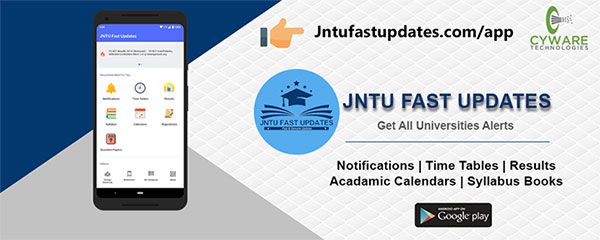JNTUK R16 4-1 Embedded Systems Material PDF Download
Students those who are studying JNTUK 4-1 R16 ECE Branch, Can Download Unit wise R16 4-1 Embedded Systems Material/Notes PDFs below.

JNTUK R16 4-1 Embedded Systems Material PDF Download
Course Objectives: This course is designed to:
- The basic concepts of an embedded system are introduced. • The various elements of embedded hardware and their design principles are explained.
- Different steps involved in the design and development of firmware for embedded systems is elaborated.
- Internals of Real-Time operating system and the fundamentals of RTOS based embedded firmware design is discussed.
- Fundamental issues in hardware software co-design were presented and explained.
- Familiarise with the different IDEs for firmware development for different family of processors/controllers and embedded operating systems.
- Embedded system implementation and testing tools are introduced and discussed.
UNIT-1
INTRODUCTION: Embedded system-Definition, history of embedded systems, classification of embedded systems, major application areas of embedded systems, purpose of embedded systems, the typical embedded system-core of the embedded system, Memory, Sensors and Actuators, Communication Interface, Embedded firmware, Characteristics of an embedded system, Quality attributes of embedded systems, Application-specific and Domain-Specific examples of an embedded system.
UNIT-2
EMBEDDED HARDWARE DESIGN: Analog and digital electronic components, I/O types and examples, Serial communication devices, Parallel device ports, Wireless devices, Timer and counting devices, Watchdog timer, Real time clock
UNIT-3
EMBEDDED FIRMWARE DESIGN: Embedded Firmware design approaches, Embedded Firmware development languages, ISR concept, Interrupt sources, Interrupt servicing mechanism, Multiple interrupts, DMA, Device driver programming, Concepts of C versus Embedded C and Compiler versus Cross-compiler.
UNIT-4
REAL TIME OPERATING SYSTEM: Operating system basics, Types of operating systems, Tasks, Process and Threads, Multiprocessing and Multitasking, Task Scheduling, Threads, Processes and Scheduling, Task communication, Task synchronisation, Device Drivers. HARDWARE SOFTWARE CO-DESIGN: Fundamental Issues in Hardware Software Co-Design, Computational models in embedded design, Hardware software Trade-offs, Integration of Hardware and Firmware, ICE.
UNIT-5
EMBEDDED SYSTEM DEVELOPMENT: The integrated development environment, Types of files generated on cross-compilation, Deassembler/Decompiler, Simulators, Emulators and Debugging, Target hardware debugging, Boundary Scan, Embedded Software development process and tools.
UNIT-6
EMBEDDED SYSTEM IMPLEMENTATION AND TESTING: The main software utility tool, CAD and the hardware, Translation tools-Pre-processors, Interpreters, Compilers and Linkers, Debugging tools, Quality assurance and testing of the design, Testing on host machine, Simulators, Laboratory Tools.
Text Books:
Embedded Systems Architecture- By Tammy Noergaard, Elsevier Publications, 2013.
- Embedded Systems-By Shibu.K.V-Tata McGraw Hill Education Private Limited, 2013.
Reference Books:
- Embedded System Design, Frank Vahid, Tony Givargis, John Wiley Publications, 2013.
- Embedded Systems-Lyla B.Das-Pearson Publications, 2013.
Course Outcomes:
- Understand the basic concepts of an embedded system and able to know an embedded system design approach to perform a specific function.
- The hardware components required for an embedded system and the design approach of an embedded hardware.
- The various embedded firmware design approaches on embedded environment.
- Understand how to integrate hardware and firmware of an embedded system using real time operating system.

320-x100(1).gif)
